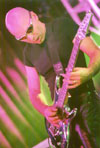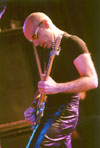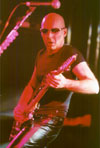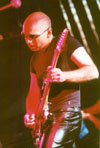Thanks Krishta!
Thanks to Portland Online Music Net
Story & Photos by Krishta Abruzzini
It was his second to the last stop before a much needed three-week rest in support of his latest release, Engines of Creation. After that, Satch is off to conquer the world. But for us lucky Northwesterners that caught his show at the Crystal Ballroom, the need for rest was unnoticed. For three and a half-hours, the high-speed fingers of Joe Satriani skated up and down the neck of his Ibanez, mesmerizing the audience and constructing sounds more human than electronic. Joe, backed by guitarist/keyboardist Eric Caudieux, drummer Jeff Campitelli, and the amazing Stu Hamm on bass, stepped into a realm of musicianship that is unmatched. From Hamm's long, classical, Beatles and hillbilly inspired bass solo, to Caudieux's techno-style keyboard and guitar riffs, to Campitelli's steady rhythms, and, moreover, Satriani's heavily harmonic laced leads, the audience was enjoying pure progressive-techno rock heaven. Joe proved his many talents, even adding in vocals and harmonica on a few songs.
 |
 |
 |
 |
| " Satch Live" | |||
Prior to the show, I got to chat with the Satch. As always, he was informative, interesting and remains in my book one of my all time favorites to have the privilege his time.
K- How's the tour?
Satch- It's great! I've only got three more shows to go, and a little live tape, so I guess four more shows, and then I get three weeks off.
K- How do you like Portland?
Satch- We love it here. Well you know, I live in San Francisco, and we're not that far away.
K- I understand that your new release, Engines of Creation, is kind of a "techno" album, is that a good label for it?
Satch- We're trying to put together two elements, basically all the words that you might use to describe what I normally do. We took all of that and we tried to meet the world of techno and trip-hop and ambient and rave and you name it, and we really did try to make an album that was one hundred percent committed to that effect. I don't know what you'd call it, but I'll let you work on that.
K- Are you playing with the same musicians that you've played with through the years?
Satch- Pretty much. I'm right now touring with Stewart Hamm on bass guitar and Jeff Campitelli on drums. But this time I also brought out (on rhythm guitar and keyboards) Eric Caudieux, who's my co-producer and engineer on Engines of Creation.
K- Do you have a home studio?
Satch- Not really. These days with the advent of digital recording you know, all I need is a teeny room. So I've just got a small little room and a lap-top computer and a couple of guitars. It gets done very quietly.
K- Why Ibenez, exclusively? Do you play other guitars as well, or is that just your favorite?
Satch- We'll, you know many years ago —this is going back to God, '86 or something like that-before Surfing with the Alien came out, before I sort of got world-wide attention, Steve Via had been signed to Ibanez. They were willing to make some guitars in the shapes and configurations that he was looking for. And I remember he was kind of unsure if other people out there were interested in these guitars and he said, "Would you mind if I had them send you some of their product to see if you like it?" And he said, "They might be interested in signing you to a deal." And at the time I said, well I make my own guitars-which, I'm not a Luthier, but at the time you could buy guitars and parts and put them together. I was working on custom guitars. So, they sent me a guitar and I actually really liked it. It was one of those unusual moments where I was unaware of some of the things that they were doing, and the guitar seemed to have all the things I wanted. I did in fact get in contact with them and we struck an agreement where they would design guitars for me-even before we thought about making models for sale. I was looking for a guitar that had the scale of a Fender, that had the pick-up arrangement and frets of an early Gibson, and that had certain elements of other manufacturers, like types of wood and particular kind of size. Anyway, they were just happy as could be to make it for me. And I said, this is incredible! Then we wound up with a model that they thought would do well in the marketplace, and we started putting them out and now I think we've put out eleven or twelve different models. And they've really progressed you know from wood, we've done one in chrome. We've done all different kinds of paint jobs using different artists, including my sisters, We even put out one made of clear plastic!
K- So are you pretty hands-on with the whole design process then?
Satch- Oh yeah! They count on that. They want to know what the musician really wants and they are really good at responding to technical problems and desires and things.
K- So do you play the guitar with your sister's artwork on it?
Satch- You know I haven't brought them out on tour-this tour-I brought out my sister Joan's two years ago. She did a series called "Electric Rainbow". Prior to that I brought out my other sister Carol's line called "Rainforrest".
K- So, there's a lot of artists in the family.
Satch- Yeah. This time a friend of mine, Jeff Bauer from San Francisco-he only did one guitar-and it has a few hundred snakes all over it. I'ts a very unusual illustration. But it cost so much money to do, and took so long that Ibanez couldn't afford to hire him to do a whole run. So it's just a one-off, and it just happens to be the one I have with me this time.
K- I have a friend who's kind of changed his musical genre from rock to instrumental and you've had great success with this, have you always played instrumental guitar?
Satch- Not really. I often call it the accidental career, because I started out on drums and switched to guitar and just spent-like any other guitarist-all my time playing with different kinds of rock bands, with all different flavors. I didn't wind up signing a contract until I was 30 years old. I had been paying my dues and playing with lots of different bands. I was in a band called the Squares with my current drummer, Jeff Campitelli, in San Francisco and we sort of slugged it out for 5 years and we sounded like a cross between Green Day and the Foo Fighters. We were so far ahead of our time we were just out of it... and we weren't as good unfortunately [laughs]! And that was kind of like what it was, I think back then they called it "power-pop". We hated that name. There was a break that we had from clubbing and rehearsing and I decided to record a really strange, avant-garde record using just guitar and no bass and no drums or synth. I thought it was kind of interesting. One funny thing happened, I got a review in a "arty" paper and they didn't know who I was, they just thought I was the weirdest guitar player they ever heard of in their lives. And I looked at that review and I thought to myself, "My God, I could become that person". Of course it was no way to pay rent becoming that avant-garde guitarist. I [later] did make another record that did include bass and drums on it. And that record caught the eye of of my friend Steve Vai. He made a deal with a record company to distribute his record which was far weirder than mine. It was a record called 'Flexible'. Whereas a lot of my music is based in roots of Rock & Roll, Steve skipped that generation. Steve's into Frank Zappa and 20th century composers. He called me up one day and he said, "You know, if they like my record, their going to love your record, so let's see if we can get you connected-up". So Relitivity Records from New York signed me to a P & D (production/distribution) deal for the first record I did on my own label and then signed me for a couple of more records. The next one I did was Surfing with the Alien and the rest is history. Along with this however, they told me I was going to have to go out and tour. And I said, "I've never done this before and not sing".
K- Did you ever have another career option?
Satch- No, just teaching guitar and playing clubs.
K- So your family was very relieved that you finally did it? (laughing)
Satch- Yes they were.
K- Would you ever consider using a vocalist?
Satch- I actually had a separate deal with Epic records back in 1990, it ran for about three or four years, where they were really interested in me getting together with a singer that was totally devoted to vocal oriented rock music. And we could just never find the right singer. This was a the time when a lot of great singers were coming out of the Northwest. Once I heard Soundgarden, I knew I probably wouldn't find another guy as good as that.
K- Could you envision yourself working with him now?
Satch- That would be amazing! I love the kind of songs he writes, they're very intricate. Lots of interesting guitar interplay with his vocals. His vocal range is incredible.
K- So what is your process with writing music?
Satch- The general process is to first sort of deconstruct after the tour and get in a location where I feel like I'm renewed and fresh. It's doesn't have to be exotic, it can be as simple as me moving the furniture around in my studio or deciding I'm going to write outside on the back porch and not downstairs in the basement. Like for the Crystal Planet record I didn't use tape recorders or anything. I had my guitar and a little metronome and a pen and paper, and I thought I'm going to write the record this way...and I'm not going to record demos that the other musicians are going to have to suffer through listening. I'm going to sit them down in a room and they're going to listen to me play and imagine themselves playing. For Engines of Creation a large amount of it I wrote just on a keyboard, so as to not have my "old" style of playing influence the record.
K- Would you recommend that someone first starting to play guitar, should start-off with an acoustic and graduate to an electric?
Satch- If you have a choice, I'd say always look for the inspiration before the memorization. The natural ability that people have to improvise and to make things-up as they go along is a very important musical tool. Anything that stops that is bad. They can always get stronger. They can always, later on, learn how to play acoustic guitar. The only difference is that when they finally do pick-up an acoustic guitar, they have to press a little harder because the strings are thicker, but that can be picked-up in a couple of weeks. That desire to play, and the flame, once it gets snuffed-out, is a difficult one to re-ignite.
K- Do you still have your first guitar?
Satch- Unfortunately I don't. I sold it to a student of mine and that particular student did not have a very good time in life... he survived, but with limited capacity and he doesn't remember where the guitar is! I know one day I'll be in a pawn shop, and there it'll be. And I did initial it, so it would be recognizable.
K- What is your opinion on musicianship and the newer bands that are out there now?
Satch- The musicianship I think is still really good. The talent level is still really good. The art of performance is quite different though. Once the heavy recording technology took root in the '70's people realized they could make great records and actually not know how to play-or not know how to perform it live. Nowadays it is the advent of this program called "Pro Tools". You can record directly into a computer and if someone is singing a little sharp or flat it can be totally corrected. Everyone, from Ricky Martin to Limp Bizkit uses Pro Tools to make their records. That is going to have an effect on how people can-I don't know how to say it without sounding crude, but "get it up" for their performance. Now, people realize that they can screw-up, because it can get fixed. That's what I see as kind of a weird thing. I think it will have a creative effect though on records because now people aren't limited to the fact that "if you can't play it, you can't record it". Now you can do whatever you want.
K- Wow, so you can even correct someone's tone-deaf voice?
Satch- Yeah, I think that's what they did with Cher (laughing).
K- To close this, perhaps you could answer some technical questions. What kind of pick-ups do you use on your guitars?
Satch- Almost all of the guitars have got Dimarzzio's. The neck position is PAM Pro, and the bridge position is a Fred.
K- What effects do you use live?
Satch- Well, it goes like this: I go into a Dunlop wah wah pedal, into a Boss DS1, into a Full Tone ultimate octave pedal, then it goes into a Digitek whammy pedal, then a superchorus (which I think is made by Boss), then into a Boss DD2 (they don't make it anymore, it's just a little digital delay pedal). Then it goes into a 100 watt Marshall amplifier (the clean channel), which I have hooked to a cabinet with four 25 watt Celestion speakers.